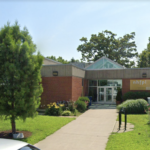
Karen Lin, Staff Photographer
By May 19, Connecticut will lift almost all COVID-19-related restrictions on businesses. In a press conference on Monday afternoon, Gov. Ned Lamont said he expects only indoor mask mandates to continue after that date.
Business restrictions will be eased over the course of the coming month, Lamont said. On May 1, the statewide curfew of 11 p.m. will be rolled back to midnight and outdoor restrictions — on alcohol without food service and on table size — will be lifted. On May 19, the Department of Public Health will “issue recommendations for safe operation of indoor & large outdoor events,” but there will be no more statewide mandates on the activities of businesses. The only caveat may be wearing masks indoors, which Lamont said he “thinks” will remain. After May 19, businesses may individually choose to preserve their own social distancing and public safety protocols.
“We’re gonna essentially end all the remaining business restrictions,” Lamont said at the press conference. “The social distancing will be relaxed — it will be up to you and your restaurant and how you want to do it to keep people safe. We’ve earned the right to get back to our new normal. On May 1 there’s gonna be a little more outside fun, which I appreciate.”
Currently, the state limits the size of indoor gatherings to 25 for private residences and 100 for commercial venues, with an additional limit to 50 percent capacity. Outdoor gatherings are capped at 100 for private residences and 200 for commercial venues. As of May 19, all of these restrictions, along with the curfew, will be lifted, although Lamont noted that the Department of Public Health will release recommendations for how gatherings should proceed. Other gathering spaces, like movie theaters, will be free to operate as they did before the pandemic.
At Monday’s press conference, the governor was questioned on why his office decided to lift all COVID-19 restrictions. Lamont said Department of Public Health Commissioner Deidre Gifford was involved in making the decision. Gifford, Lamont and Department of Economic and Community Development Commissioner David Lehman “spent an hour or two Sunday morning” working out the details of the plan, Lamont said. Paul Mounds, Lamont’s chief of staff, said that Gifford and Lehman had consulted with other experts to make this change.
“The governor really has asked those two commissioners to do the necessary research to inquire with their counterparts in different states to really look at data and really come back to the governor with those answers, and eventually recommendations to the governor to make a final decision,” Mounds said. “It’s not just a matter of a small group thing.”
The date of May 19 was a deliberate choice from the governor’s office — it is only one day before the executive powers granted to Lamont over a year ago by the state legislature to take action against the pandemic are set to expire. After May 20, Lamont would not have the authority to unilaterally make such a change immediately.
While the governor expressed confidence in his plan, members of the press on Monday continued to push for clarification on the decision process, repeatedly asking if Gifford was truly the only public health professional consulted. Officials said that while Gifford closely advised the governor, Gifford herself gathered input from other experts across the country.
Luke Davis, a professor at the Yale School of Public Health, told the News he didn’t think “it’s as if the decision was made by one individual.” Davis said Gifford is being advised by “a number of public health officials,” including officials at Yale.
In November, Davis launched a petition to close down indoor dining and exercise facilities, noting that hospitals were overwhelmed with patients and such an order was necessary for “the well-being of the population of our state.”
On Monday, Davis said that it is not yet clear whether or not Lamont’s decision was “a good idea,” but that at this point in the pandemic, officials do need to begin seeing what will and won’t work.
“Now that we’re at a point where it seems pretty apparent that COVID’s going to be with us to stay in some form that we probably do need to start testing the limits gradually to see what can be done,” Davis told the News. “I think the state’s been really aggressive about trying to get everyone a decent offer for a vaccine, so I think we’ll find out what’s going to happen.”
Davis added that some of Monday’s decision likely stems from political reasons and pressure from the media, which has shown that Americans are “ready to relax,” he said. It is also important that officials react quickly to how the eased restrictions impact COVID-19 data, “so that if things begin to go in the wrong direction, it’s clear where corrections are needed,” he said.
In response to questions about spikes in COVID-19 cases after state governments lifted restrictions — particularly in Texas, where a mask mandate was recently removed — Lamont said Connecticut’s plan is far more meticulous.
“Obviously we’re going to watch it like a hawk,” he said. “We’re opening cautiously. [Texas] tore off the masks — they said ‘let it rip.’ They gave people a certain disregard for protocol. We’re not doing that.”
Lamont and his chief operating officer, Josh Geballe, both stressed that avoiding such a spike would entail the state continuing its robust vaccination efforts. After halting its use of the Johnson & Johnson vaccine last week, Connecticut is still operating FEMA mobile clinics across the state and had distributed over 2.7 million vaccine doses as of Monday.
Should a COVID-19 cluster emerge in a particular community following May 19, the state will intervene to help, Geballe said.
“We’ll continue to partner with local communities as needed to help them in whatever ways requested, but the most important thing is to keep driving forward on the vaccinations,” Geballe said. “That’s another key factor in these decisions, is the success we’ve had thus far in our vaccination program and the momentum we continue to enjoy.”
In its reopening efforts, Connecticut also plans to bring back students to its state colleges in the fall, Lamont announced today. But, unlike Yale, these colleges do not plan to require students to be vaccinated — and the governor expressed uncertainty over whether this will change.
“We’ve got 88 percent of our people in the older age group vaccinated,” Lamont said. “If we could [vaccinate college students] on a voluntary basis, we will. But if we can’t, we’ll have to make up our mind on that a little bit later this summer.”
The city of New Haven has not yet released a statement about Lamont’s announcement. The mayor’s office did not respond to multiple requests for comment.
Lamont’s executive powers have been extended three times by the Connecticut General Assembly, most recently from April 20 to May 20.
Owen Tucker-Smith | owen.tucker-smith@yale.edu










